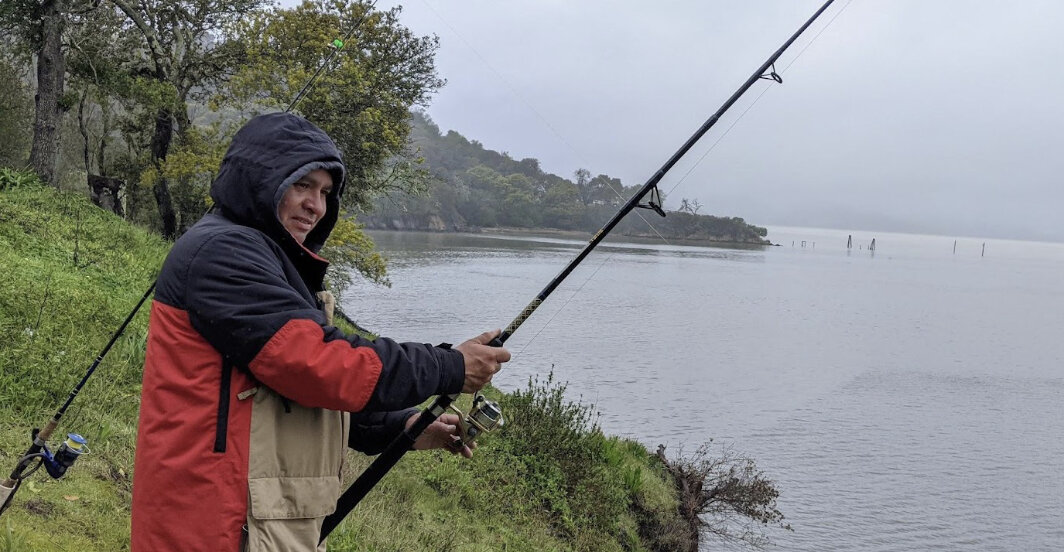
Hooked on fishing
Why it’s fun to fish at the park, and how to do it right
Throughout our region’s history, people have cast a line or net into the green-blue waters of the bay, hoping to catch a fish for food or sport. In fact, China Camp’s history is entwined with fishing, with Chinese shrimpers and fisherman dependent upon the bay’s bounty.
While China Camp Village is no longer a vibrant commercial fishing community, plenty of anglers still enjoy the park, often trying their luck from the scenic points that jut out into San Pablo Bay. It was in such a spot, on the tip of Weber Point, that we met up with a fisherman, baiting his hook with redworms in hopes of snagging a striped bass. The angler, named Jesus, told us he learned to fish five years ago with his friends. They taught him the right spots, the best equipment and bait, and how to use the rhythm of the tides to increase his chances of catching a fish.
Now, fishing has become an important activity for Jesus. Once a week he sets up his rods, usually with friends, then patiently waits, hoping to bring home fresh seafood for supper.
“I bring the fish home to my daughters and they cut it into smaller pieces, season it, and fry it,” Jesus says. “My girlfriend makes white rice and salad with cucumbers and carrots on the side to go along with it.”
Before finding this fishing spot in China Camp, Jesus fished in Novato, at Bel Marin Keys, but grew dismayed at the area’s trash and the lack of respect for the wildlife.
“People were baiting their hooks with anchovies, and ducks would bite at the hooks,” he explains. “It was not good for the ducks. There was trash and fishing line and hooks everywhere. Eventually, officials closed off the area and kicked everyone out, he notes.
With his normal fishing spot closed, Jesus decided to try out the protected shores of China Camp. Sitting at the edge of the bay, water lapping at the cliffs, we can’t help thinking how lucky we are to have this beautiful and pristine spot to relax, cast a line, and hope for a strike. Good luck catching supper, Jesus. We hope to see you again soon.
Five tips for safe, smart, and legal fishing
Whether you’re fishing for the first time, or you’re a seasoned angler, you can enjoy a day of fishing at China Camp, and help keep our bayfront beautiful and healthy. Here are helpful fishing tips from the California Department of Fish and Wildlife (CDFW):
- Get a fishing license. If you are planning to set up your rods along China Camp’s cliffs, you’ll need a valid fishing license, available from CDFW. (Note that no license is required to fish from the China Camp Village pier. Also, those ages 15 and under don’t need a fishing license.) And yes, CDFW rangers actively patrol our shoreline and fine anglers who shirk these rules.
- Leave the shoreline cleaner than you found it. Fishing line, hooks, nets, and other trash can injure—even kill—wildlife. (Read more about the risks of entanglements.) At the end of the day, be sure to clean up any garbage, and remove everything you brought with you—including cigarette butts. (FYI, smoking is not allowed at China Camp or any California State Park.)
- Keep or release? Know the rules. Species like striped bass can be reeled in year-round, but others like rockfish and sturgeon have seasonal restrictions, and you might need to release them. Check out the CDFW’s comprehensive seasonal species list for San Francisco Bay to keep up to date on current regulations on size and species limits. State regulations also require anglers to report their harvest of some species, most notably white sturgeon, at China Camp. Find out more about these required harvest reports and how they help CDFW track and manage fish populations.
- Watch out for waterfowl. If you see waterfowl heading towards your baited hook for a nibble, reel in your line and wait for birds to pass.
- Know you’re helping to protect wildlife. When you buy a new fishing rod or other gear and pay tax on it, or when you buy your fishing license, give yourself a little pat on the back. These taxes and your license fees go directly towards conservation and restoration efforts to improve fisheries and habitat, and help fund related research, education, and public access.
To learn more, visit the CDFW page about fishing regulations in the San Francisco Bay Area.
—by Sheila Coll

